
33 minute read
Tax, Public Law Centers
NEW CENTER EMPHASIZES UVA’S CONTRIBUTIONS TO TAX LAW
THE VIRGINIA CENTER FOR TAX LAW has been established at the Law School, with Professor Andrew Hayashi serving as the center’s first director. The center will bring to the fore faculty scholarship in tax law—emphasizing the present conversation while building upon UVA Law’s historical strengths and storied past in tax.
Advertisement
Because of the problems the nation and the world face, the addition of the center comes at a timely moment.
Hayashi is the Class of 1948 Professor of Scholarly Research in Law and an expert in tax law, tax policy, and behavioral law and economics. Prior to joining the Law School, he was a fellow at the Furman Center for Real Estate and Urban Policy at New York University, where his research focused on the effects of tax policy on real estate and housing markets. He practiced tax law earlier in his career as an associate at Davis Polk & Wardwell. Hayashi holds a doctorate in economics from the University of California, Berkeley.
The center’s other faculty include Michael Doran, Joshua Fischman, Kevin A. Kordana, Ruth Mason, Paul B. Stephan ’77 and Ethan Yale.
In addition to their scholarly endeavors, the faculty remain engaged with practice organizations such as the ABA Tax Section, the American Law Institute, Congress, the Treasury Department and the IRS.

UVA’s strength in tax owes a considerable debt to the past, Hayashi said.
The late alumni Mortimer Caplin ’40, former IRS commissioner, and Edwin S. Cohen ’36, a former undersecretary of the Treasury, are among the Law School’s storied government servants who taught at the Law School. Professors Emeriti George Yin, Mildred Robinson and Thomas R. White III have also been exemplars, Hayashi said. The trio have served in influential volunteer and public service roles. Yin served as chief of staff of the U.S. Congress’ Joint Committee on Taxation, one of the most influential tax positions in the country. And, of course, countless alumni who weren’t academics have served in senior positions in government and private practice. “These are people who are responsible for the distinguished history of tax scholarship and service at UVA,” Hayashi said. Virginia offers one of the strongest tax law curricula in the country, and is home to the Virginia Tax Review, the nation’s leading student-edited tax journal. In addition to their work in the classroom and on the journal, students have won the International and European Tax Moot Court competition three times in a row, and fielded the first U.S. team to win the event.
Faculty, students and alumni also learn about cutting-edge issues in tax from the Virginia Tax Study Group, an annual tradition at the Law School that brings together alumni from private practice, government and academia. In the fall, the annual UVA Invitational Tax Conference brings leading tax academics to Grounds to discuss scholarly works in progress. Students are invited to attend both meetings. During the summer, the Law School hosts the Virginia Conference on Federal Taxation, an annual conference that marked its 70th anniversary in 2018.
NEW PUBLIC LAW CENTER FOCUSES ON FACULTY DEPTH INECONOMIC METHODS

A NEW CENTER that applies economics to the study of law and politics has been established at the Law School. The Center for Public Law and Political Economy is led by Professor Michael D. Gilbert.
Gilbert said political economy can be a broad category, but for the purposes of the center, “It refers to the application of economic theories and methods to legal and political phenomena. It’s using the tools of economics to think about puzzles in public law. The center will unify the scholarship and teaching of our many faculty members who draw on political economy in their work.”
In addition, the center will promote new research, connect with students and build upon the Law School’s longstanding strength in this area. The school has a law and economics working paper series as well as a faculty workshop sponsored by the John M. Olin Program in Law and Economics.
Gilbert himself is an expert in law and economics, legislation, election law, direct democracy and judicial decision-making.
UVA as a whole has been a leader in the political economy discussion since the 1950s and ’60s, when James Buchanan and Gordon Tullock wrote “The Calculus of Consent,” and Ronald Coase wrote “The Problem of Social Cost.” Buchanan and Coase, who later each won the Nobel Memorial Prize in Economic Sciences, wrote those seminal works while on the UVA faculty.
“Their works form much of the backbone of this area of study,” Gilbert said.
Today, the next generation of economics-based research leaders includes UVA Law faculty. In addition to Gilbert, the center’s affiliates are Kevin Cope, Joshua Fischman, Andrew Hayashi, Jason S. Johnston, Edmund W. Kitch, Michael A. Livermore, Julia D. Mahoney, Paul G. Mahoney, Ruth Mason, John K. Setear, Paul B. Stephan ’77, Megan T. Stevenson, Pierre Hugues-Verdier, J.H. “Rip” Verkerke and Mila Versteeg.
Like Gilbert, who holds a Ph.D. in jurisprudence and social policy from the University of California, Berkeley, several of these faculty members have doctorates in the areas of economics and political science.
A sampling of recent articles by the faculty includes “Algorithmic Social Engineering” by Stevenson, an economist and criminal justice scholar; “Identifying Illegal Subsides” by Mason, an expert in international tax issues; and “Computationally Assisted Regulatory Participation,” by Livermore, who studies bureaucratic oversight and the computational analysis of law. To encourage students who may be interested in this area of study, the center plans to host events as well as to delineate connections between courses whose titles may seem dissimilar, but which call upon economics-based research methods. “If you take Securities Regulations from Paul Mahoney, and Constitutional Law and Economics from me, those might sound like very different courses, but in fact you’ll see commonalities in our methodological approach,” Gilbert said.
Next year the center will host the 16th annual Conference on Empirical Legal Studies, known as CELS, at the Law School.
Gilbert is also associated with the Karsh Center as a Martha Lubin Karsh and Bruce A. Karsh Bicentennial Professor of Law. He is author of more than two dozen articles or book chapters, including the chapter “Constitutional Law and Economics,” which he co-authored for the forthcoming book “Research Methods in Constitutional Law.” He is an affiliate of the Corruption Lab on Ethics, Accountability, and the Rule of Law, or CLEAR, part of UVA’s broader Democracy Initiative.
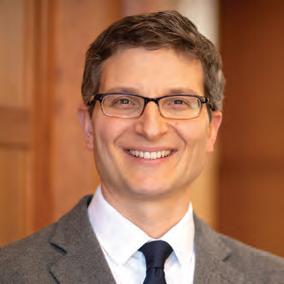

❱JonRe Taylor, pictured in Baton Rouge, Louisiana, is taking her support for a convicted man, and fair trials, all the way to the U.S. Supreme Court with help from Professor Thomas Frampton, below.
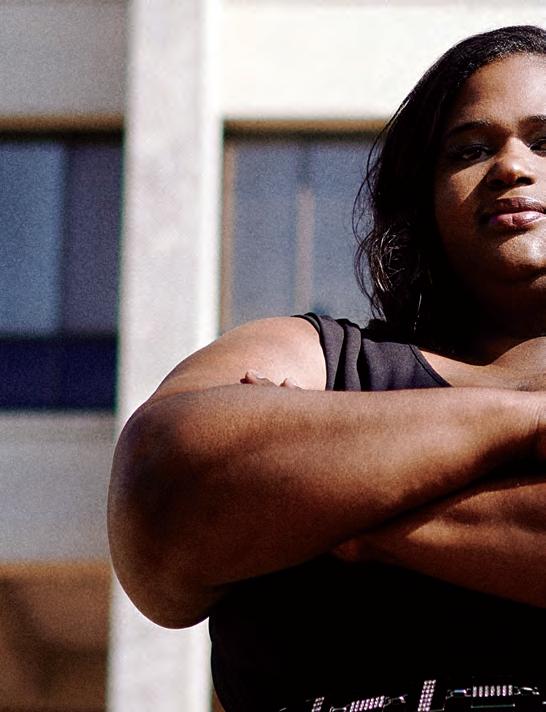
JUROR NO. 12 WANTS HER VOICE HEARD

JONRE TAYLOR was the lone Black juror and the lone vote of dissent.
The other 11 Louisianans on the panel convicted teenager Thedrick Edwards in 2009 on charges of aggravated rape, armed robbery and aggravated kidnapping stemming from a 2006 crime spree. Edwards was among a group of young Black men who were initially indicted, while the victims were white college students.
More than a decade later, Taylor, who served as Juror No. 12 in a state that allowed nonunanimous jury verdicts, has not given up on the idea that her voice matters.
The former juror teamed up with a Law School professor, who handed her a megaphone recently through what may be a first-of-its kind amicus brief to a case before the U.S. Supreme Court, Edwards v. Vannoy.
“I have hopes that it will make a difference,” Taylor said.
Amicus curiae, or “friend of the court,” briefs contain additional information for the court to consider before ruling. Professor Thomas Frampton wrote the novel brief from the perspective of a single juror— rather than the usual advocacy group or legal authority.
Frampton, who had already been considering filing an amicus, and Taylor “started talking and initially it was just sort of background conversations while I was trying to learn as much as I could about the case,” he said. “It was fascinating to me to see how well Ms. Taylor remembered nuances of the trial.”
Taylor said in a recent interview with UVA Law that she believes Edwards, a high school honor roll student when the spree occurred, fell in with a bad crowd and, based on evidence presented, likely served as a lookout rather than an aggressor.
For her, the facts didn’t line up, which led to her reasonable doubt. Taylor was in her mid-20s and a recent college graduate at the time of the trial, and the juror closest to Edwards’ age, in addition to being of the same race. The other jurors were much older, and they identified as white in court records. “I don’t feel like my voice mattered at all,” she said. Edwards would not have been convicted if the trial were held today and had the same jury outcome. The U.S. Supreme Court ruled in 2020 in another case, Ramos v. Louisiana, that nonunanimous verdicts are unconstitutional, prompting Edwards to petition the court. He argues he’s being illegally detained and should either receive a new trial or be set free. (Louisiana voters notably rejected nonunanimous rulings in a statewide referendum prior to the Supreme Court’s ruling.) While Frampton acknowledges the chances are slim that the court will make Ramos retroactive, overturning countless previous decisions, the case will force the court to reconsider—amid national cries for criminal justice reform—the fairness of past decisions in which juries have been split and racially stacked. Was justice served in Edwards’ and other cases?
Taylor wants the world to know her vote was not uninformed, nor unsympathetic to the victims. Convicting not just “a” person, but the right person, was important to her.
“If people can’t be completely sure, how can you give a person life or death?” she asked.
In the amicus, Frampton says the fact that Louisiana was an outlier in terms of how it applied its rules bolsters Edward’s case and reinforces Taylor’s grievance.

—Eric Williamson

ALUMNA RETURNS TO LEAD ADMISSIONS
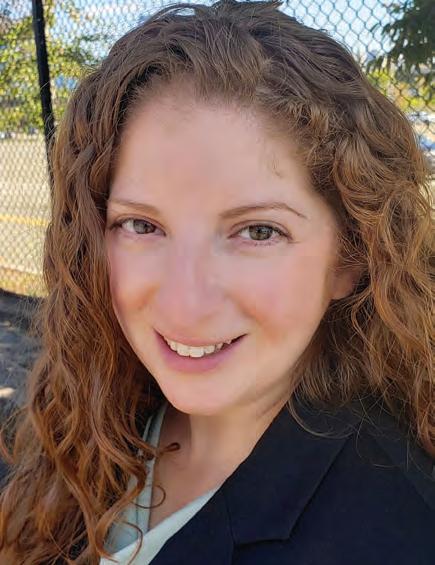
NATALIE BLAZER ’08 has joined the Law School as assistant dean for admissions.
Blazer previously served as director of J.D. admissions at the Georgetown University Law Center. She was also associate director of admissions and strategic initiatives recruiter at Columbia Law School, and a senior litigation associate at Weil Gotshal & Manges.
She said she is proud to return to UVA Law and welcome new students.
Dean Risa Goluboff said Blazer’s experiences at Georgetown and Columbia means she will hit the ground running at UVA.
“She also has the benefit of being a UVA Law graduate with firsthand knowledge of our community and all that the school has to offer,” Goluboff said. “We are so glad she will lead our Admissions Office, identify new and innovative approaches to broadening our applicant pool, and continue to recruit academically talented and diverse classes to the Law School.”
The Class of 2023 is the first in the Law School’s history in which women make up a majority, and the most racially diverse class in 10 years. Blazer said she wants to keep that momentum going by connecting prospective students with affinity groups and alumni networks, holding outreach events at places such as historically Black colleges and universities, and highlighting how diverse students contribute to the UVA Law community.
“I’m very mindful of making sure that our incoming class is representative of students of color, first-generation students, low-income students, anyone who’s historically underrepresented in law school and in the legal profession,” she said.
In law school, Blazer served on the editorial board of the Virginia Journal of Social Policy & the Law, co-chaired the Conference on Public Service and the Law, was a Peer Advisor, and interned for the Sarajevo War Crimes Tribunal’s Office of the Prosecutor. After graduation, she clerked for Judge Liu Daqun of China at the U.N. International Criminal Tribunal for the Former Yugoslavia in The Hague.
Blazer majored in political science and French as an undergraduate at Boston College. —Mike Fox
DIRECTOR OF PUBLIC SERVICE ADDS TO COUNSELING STAFF
LEAH GOULD has joined the Law School as director of public service.
Gould works under the direction of Assistant Dean for Public Service Annie Kim ’99, who now leads both the Mortimer Caplin Public Service Center and Program in Law and Public Service. Gould’s role adds a new position to the counseling staff that also includes Senior Director of Public Service W. Lawton Tufts and Director of Public Service Amanda Yale.
“We’re so fortunate to have Leah join our Public Service Center team,” Kim said. “She’s incredibly accomplished as a former DOJ trial attorney and AUSA. But beyond that, Leah knows exactly what it means to carve out your public service path as a law student, keep your eyes on the prize and believe in yourself.”
Gould, a former Navy lieutenant, previously served as an assistant U.S. attorney in the U.S. Attorney’s Office for the District of New Jersey, prosecuting criminal cases such as firearms, Hobbs Act robberies, narcotics, trafficking, child exploitation and whitecollar crimes. She was also a trial attorney with the U.S. Department of Justice Antitrust Division through the Attorney General’s Honors Program.
But it was her experience as an intelligence officer and mentor in the military that nurtured her interest in leading others to achieve their goals and inspired her to make the leap to academia.
“I was getting to the point in my career where I was looking to make a change,” Gould said, “and I saw this opportunity and it really jumped out at me because it reminded me how much I loved working with people to help guide them.”
Gould clerked for U.S. Judge Reed C. O’Connor of the Northern District of Texas. She earned a J.D. from the University of Colorado Law School and a bachelor’s in international affairs from the George Washington University Elliott School of International Affairs. —Mike Fox
NEW CLINIC HELPS PASS LEGISLATION—WITH BIPARTISAN SUPPORT
THESE DAYS, changing laws with bipartisan support is rare. But the Law School’s new State and Local Government Policy Clinic, which provides Virginia’s lawmakers and governmental executives legal and policy research support for their initiatives, is doing just that.
In its inaugural year, the clinic helped all of its state lawmaker clients—Republicans and Democrats—see their bills through to approval, including two pieces of legislation whose prospects for passage were anything but a given. In both cases, law students were helpful in bringing opposing stakeholders together in cooperation.
Clinic Director Andrew Block said working with legislators of both political parties is a critical aspect of the clinic.
“Being part of a state school, it’s important for us to look beyond party affiliation and be a service to everyone,” said Block, a former director of the Virginia Department of Juvenile Justice who currently serves as vice chair for the Commission to Examine Racial Inequity in Virginia Law.
Students in the clinic researched and wrote initial drafts of legislation, produced talking points and other communication materials, met with stakeholders and, in many cases, testified in support of the bills, making them essential to the outcomes.
A TRANSFORMATIVE BILL FOR CRIMINAL DEFENSE
Another was how to protect the public from someone who is found not guilty and let go, who may later decline mental health services and pose a threat. “We kept trying to get [lawmakers] to understand that’s not likely to happen, because most people who have done something dangerous, there’s something else you can charge them with that doesn’t involve intent,” McClellan said. And, those who are sick and demonstrating signs “should be getting services in the community before they get arrested.” Complementing the clinic’s efforts, Professor Richard Bonnie ’69, an expert on the intersection between mental health and criminal law in Virginia, was among those integral in making the case for the addition. “It took a lot of discussion to get mental illness included,” Freeman said. “Not only did we have to appease people, but we had to get the best version of the bill passed.” McGoey added, “I came to UVA to learn how government works and to get exposure to the levers of government in motion. I actually really liked the horse trading.” In the past, only defendants with deep financial resources were able to make a case, through expert assessment during pretrial plea bargaining, that a mental illness connection warranted a downward sentence. The bill “was a major change, because the only real-time chance for a court to consider mental illness was at sentencing, unless you were Kyle McGoey ’21 and Lukus Freeman ’21 worked on SB 1315 for Sen. pleading guilty by reason of insanity, which is really difficult and hardly Jennifer McClellan ’97, a Democrat. The bill transforms how Virginia anyone ever does,” McClellan said. law treats mentally impaired criminal defendants. She emphasized that the legislation wouldn’t have gotten
Prior to passage of the bill, defendants with either mental written without the students. After their previous session, illness or intellectual or developmental disabilities were the General Assembly went into “COVID crisis mode.” precluded from introducing evidence of their condi“We were in a special session dealing with a contion to show they lacked the mental state necessary stituent crisis. The students did the work my office to be found guilty of the charged crime. The bill now would normally do.” allows for the introduction of such evidence, bringing Virginia in line with other states. MOVING BEYOND
In addition, the bill requires consideration of a de- JUST ‘PASS OR FAIL’ fendant’s intellectual or developmental disability at bail Juliet Buesing Clark ’21 and Tim Shriver ’22 worked on and sentencing decisions, and requires new training for VIRGINIA SEN. JENNIFER McCLELLAN ’97 Republican Del. Carrie Coyner’s HB 2027. lawyers on the representation of people with these conditions. The bill aimed to solve an educational problem for the state’s
The legislation was part of a larger criminal justice reform package children in grades 3-8. As a former Chesterfield County School Board McClellan and fellow Democrats were able to move forward. member, Coyner recognized the angst that one “high stakes” year-end
After completing their research, Freeman and McGoey worked testing period in reading and mathematics caused students, as well as through the policy options with the senator and wrote a bill. But a their teachers and parents. Because the Standards of Learning exams problem arose. The companion bill that passed out of the House only happen so late, they’re not useful as a developmental tool, either, she said. allowed people with intellectual and developmental disabilities, not The delegate vowed to students: “We’re going to give you smaller mental illness, to introduce evidence of their condition. The House little bites of assessment throughout the year, and we’re really going and Senate needed to be on the same page. to see where you are.”
One sticking point was how to define mental illness, because the Many of her fellow lawmakers sympathized, but since federal funding definition to receive mental health services is a lot broader than a court hinges on determining whether students reached overall proficiency would allow as a defense, McClellan said. during the school year, Coyner needed a bill that would comport with
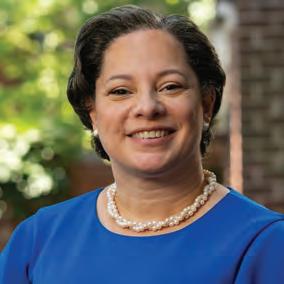

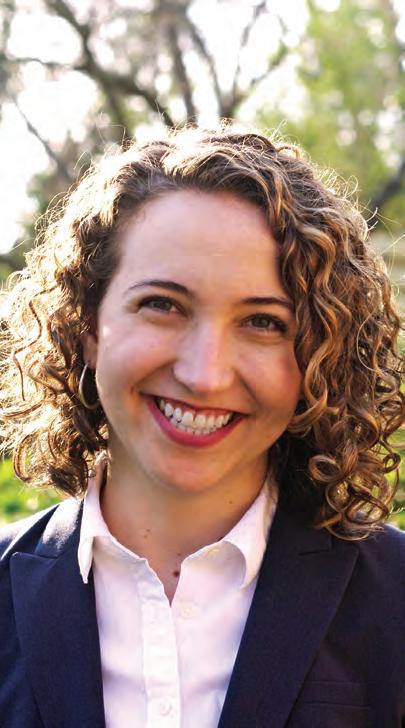
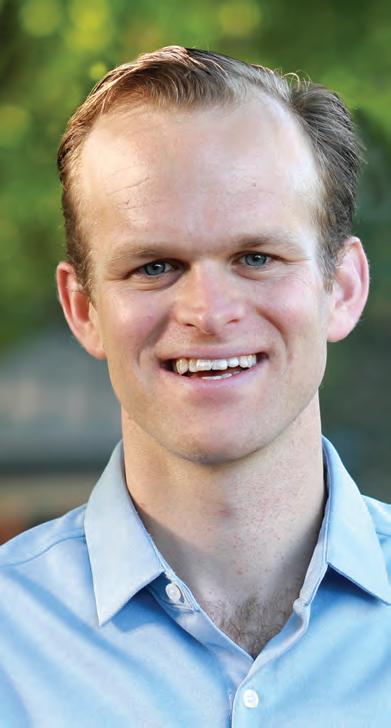

JULIA DAVIS ❱ CLOCKWISE FROM TOP LEFT: Students Juliet Buesing Clark ’21, Lukus Freeman ’21, Tim Shriver ’22 and Kyle McGoey ’21 helped successfully shepherd legislation in the Virginia General Assembly this past session.
federal requirements. At the recommendation of a legislative colleague, she sought the clinic’s assistance.
For Shriver and Clark, the work was full of meetings, urgent deadlines and on-the-fly changes. They researched how states such as Georgia, North Carolina and New Hampshire handled similar problems, often speaking directly with officials, to figure out what worked in achieving through-year testing.
The students built a proposal that considered such factors as the number of tests and teacher requirements, which not everyone agreed upon.
“There were a lot of moments where we needed to make a change to keep a group on board,” Shriver said.
Before law school, Clark taught in Boston for five years as high school English teacher, and Shriver helped launch a public schools mentoring program in New York and San Francisco.
Coyner, a lawyer who earned her undergraduate degree from UVA, said she was impressed that both of her assigned students had relevant backgrounds that allowed them to keep pace.
“They were amazing,” she said. “They met with all the advocacy groups. They attended all of my committee meetings and testified in all of my committees. I really utilized them as experts because they had done it all. I could not have kept up given how short the session is without that team. They helped me craft a path forward.”
That path involved some creativity on the part of students. It seemed that Virginia either needed a year-end test to assess grade-level comprehension or it needed to apply for a waiver from that system. But the latter would come with no guarantee that the federal government would sign off on new measures to test throughout the year. So, essentially, the law students split the difference. The new legislation now mandates through-year testing and a final overall assessment, in alignment with Standards of Learning, until the waiver process can be completed.
Full implementation, including giving students tests that are above and below their grade level, is to occur in the 2022-23 school year. —Eric Williamson
BY JOE FORE ’11
EVERYONE WANTS concise writing—writing that conveys information in the shortest, simplest way possible. But while most of us know concise writing when we see it (or, just as often, when we don’t see it), it can be hard to achieve it in our own work. Here are four tips that will have you writing more efficiently.
TIP 1: BREAK UP LONG SENTENCES
Shortening sentences is the fastest way to make your writing more concise. Because legal writing often involves complex concepts, it can be tempting to mirror that complexity in longwinded sentences that cram multiple ideas together. Fight that temptation.
stuff. What’s harder is cutting common expressions that are longer than they need to be. Anywhere you can save is a plus: fewer letters, fewer words, fewer syllables. See the box below for some common legal writing phrases and their shorter, simpler substitutes. For extra impact, combine this tip with the previous one and swap longer transitions for shorter conjunctions at the start of your sentences. And can replace Furthermore or Additionally at the start of a sentence, while But is a good stand-in for However. And if you tend to use Therefore, Accordingly or Consequently to show causation, try trading it for the peppier Thus or even So.
TIP 4: NIX NOMINALIZATIONS
Nominalizations are nouns formed from other parts of speech—words like explanation, settle-
4 TIPSTO MORECONCISELEGAL WRITING
Instead, break long sentences into shorter ones that each make a distinct point. Then, connect those shorter sentences with transition words to show the relationships between your ideas. For example, here Justice Ruth Bader Ginsburg summarizes the life cycle of a criminal case in four crisp sentences linked with clear transitions (highlighted):
Criminal proceedings generally unfold in three discrete phases. First, the
State investigates to determine whether to arrest and charge a suspect. Once charged, the suspect stands accused but is presumed innocent until conviction upon trial or guilty plea. After conviction, the court imposes sentence. Justice Ginsburg’s longest sentence contains 17 words; her shortest just six. Now, not every sentence can be as succinct as her last line. Nor would you want it to be. Your writing should contain a variety of sentences—some a bit shorter, LONGER WORD/PHRASE some a bit longer. But, overall, strive for an average prior to subsequent to, followingsentence length of around 20 words. as a result of
TIP 2: START SENTENCES notwithstanding in order to
WITH CONJUNCTIONS utilize One of the easiest ways to shorten sentences while preserving flow between them is to start more sentences in the present/instant case at the present time demonstrates with But and And. Forget what you may have learned numerous in school; starting sentences with conjunctions is not approximately only grammatically correct, it’s good practice. Great writers do it all the time. Take the Supreme Court’s 2018 decision in Sessions v. Dimaya. Justice Elena Kagan started nearly 50 sentences with But or And in her 25-page majority opinion, while Justice Neil Gorsuch did it more than two dozen times in his 18-page concurrence.
TIP 3: USE SHORTER WORDS AND PHRASES
Short and simple language is a hallmark of clear, concise writing. So look for places to purge longer and more complex words from your newly shortened sentences. But it’s not just about excising esoteric terms and legalese—concomitantly, heretofore, arguendo. That’s a given; that’s the easy
ment and viability. They present special problems for writers seeking concision. First, they’re typically longer than the verbs or adjectives they’re formed from (settlement vs. settle, viability vs. viable). They also require us to add extra words to make sentences grammatically correct. Take, for example, this sentence:
The majority opinion contains a discussion of legislative history. At just nine words, the sentence isn’t long from an objective standpoint. Still, CONCISE REPLACEMENT because it uses the noun discussion rather than the verb before after discuss, it’s longer than it because needs to be. Not only is disdespite cussion a bigger word, using to it also forces us to add an use article (a), a preposition (of ) here now shows and a verb (contains). Changing discussion back into a many verb lets us streamline the about sentence—and make it more active, to boot:
The majority opinion discusses legislative history. Once you’re aware of nominalizations, you’ll see them (and cut them) everywhere—from pleadings and contracts to emails and text messages. No longer will you enter into an agreement or make a decision; you’ll simply agree or decide.
Professor Joe Fore is co-director of UVA Law’s Legal Research and Writing Program.

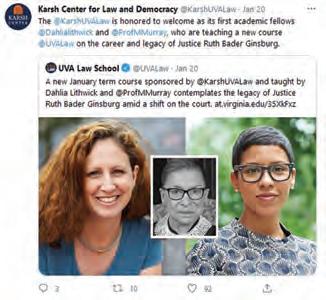
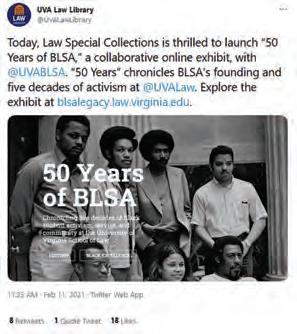
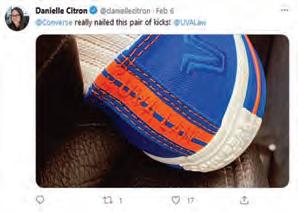
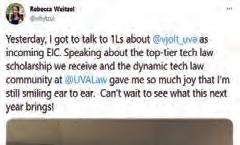

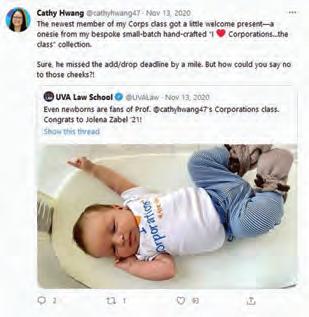
WITNESSES
“I LOVED MY INTERNATIONAL LAW/USE OF FORCE SEMINAR. Professor Ashley Deeks really brought the subject to life for me. Even though about half of my classmates were virtual and half were masked in class, I still got to know everyone very well. During our short, in-class breaks we would pop outside— masked and socially distanced, of course—and Professor Deeks would hang out with us and regale us with some of her Department of State stories. We also had several judge advocate general LL.M. students in the class that were able to speak to their experiences with international law. Toward the end of the semester … we simulated a U.S. National Security Council Situation Room meeting and each student played a role (president, State Department legal adviser, etc.). It was fun and challenging to apply the law to a (simulated) high-stakes scenario.” —CAIT KUTCHI ’22

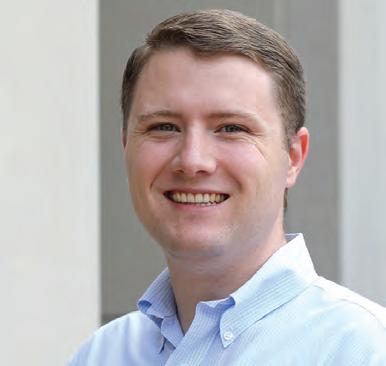
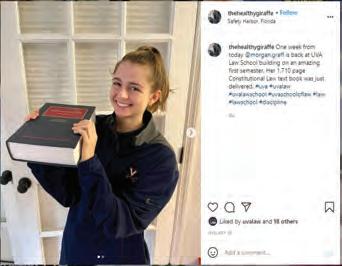




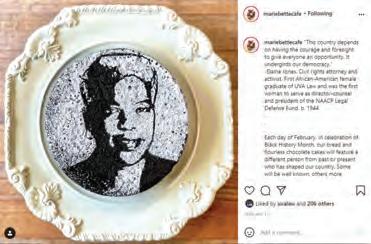
“WE NOTICED THAT WHILE THERE ARE LOTS OF STUDENT GROUPS AT UVA that promote the benefits of practicing in one place or another … none of them promoted the benefits of practicing in Virginia. In reviving the [Virginia Bar Association Law School Council] chapter, we hoped to encourage students to consider a career in Virginia. To that end, the VBA provides students at UVA with the opportunity to meet, engage with and learn from Virginia practitioners by hosting networking events and receptions for students interested in exploring both private practice and public service careers in Virginia; career panels with Virginia practitioners and current students heading to Virginia offices; and socials with current students and Charlottesville/Albemarle Bar Association members.”
—C. ALEX RETZLOFF ’21
Virginia Bar Association Law School Council President

CATCHING UP WITH ALUMNI 5, 10, 15
5
MCKINLEY HYMAN ’16 ASSOCIATE WYCHE GREENVILLE, SOUTH CAROLINA
DESCRIBE YOUR WORK: I represent both corporate and individual clients in litigation-, employment- and education-related matters. I spend my day-to-day counseling clients on various labor and employment-related needs, assisting higher education institutions with Title IX work, and researching, briefing and arguing a variety of matters in litigation.
WHAT ACTIVITIES DO YOU ENJOY OUTSIDE OF WORK? I love exploring, whether it’s a new country or my hometown of Greenville—I am always on the lookout for new experiences—and things to eat! I particularly enjoy the outdoors, exercising, animal rescue, craft beer (like any good millennial) and horror movies.
ARE YOU WHERE YOU EXPECTED TO BE AT THIS STAGE OF YOUR CAREER AND LIFE? Career-wise, yes, more or less. While at UVA, I discovered a fondness for labor and employment law (shoutout to Professors Rip Verkerke and Kim Forde-Mazrui!) and envisioned myself practicing in that area, in the Southeast, and at a firm that made me happy to go to work each day. While each of these things have (happily) come to fruition, I have also come to enjoy additional areas of practice that I did not necessarily plan on, but each of which add even more fulfillment to my legal career. Life-wise, I hoped to be married to my then-boyfriend and for us to travel the world in our free time. While the COVID-19 pandemic has certainly put a damper on those travel plans, I am happy to report that I did marry that guy, and that we have had plenty of adventures and look forward to many more to come. I am looking forward to the next stage of my career and life, and to many more opportunities for personal and professional growth.
WHAT DO YOU LIKE ABOUT YOUR LIFE 5 YEARS AFTER LAW SCHOOL? Just about everything! I love where I live; Greenville was not on my radar in law school, but I could not be more grateful to have been led to such a vibrant and lovely part of the Southeast. I am blessed to have spent the past five years, and counting, with a wonderful husband, and we are overjoyed to be expecting our first baby in July. I’m also fortunate to be practicing law with a group of amazingly accomplished individuals (and friends) who use their talent and creativity to make a positive difference for our clients and for our community. I am continually inspired not only by their intellect, but also by their genuine care for and commitment to those around them.
5, 10, 15 AND 25 YEARSAFTER LAW SCHOOL

10V. SHIVA GOEL ’11
PARTNER HARRIS, WILTSHIRE & GRANNIS WASHINGTON, D.C.
DESCRIBE YOUR WORK: I work in tech and telecom policy. My clients launch satellites, build wireless networks and expand connectivity the old-fashioned way, by trenching lines in the ground. They also help us abstract away from physical infrastructure, often through the cloud, and develop a wide range of emerging technologies enabled by the internet. Many of them have made bridging the digital divide a focus of their missions. As you might imagine, their efforts frequently raise regulatory issues that are novel or unsettled— or constantly resettling. So I help them shape and navigate the federal regulatory environment, and problem-solve around its uncertainty. I advocate for them in administrative proceedings—think agency rulemakings, investigations and transaction reviews—and in appellate and trial litigation. I also counsel clients on new products and services, and help them steer through regulatory waters to get their deals done.
WHAT ACTIVITIES DO YOU ENJOY OUTSIDE OF WORK? My extracurriculars focus on my 2-yearold, Ella. When I’m able, I road test the vocabulary I built at meetings of the Virginia Law Wine Society, which my friends Mark Littmann ’11 and Hunter Landrum ’11 founded our 1L year. I’m also a recovering wrencher. In my younger days, I had project cars and engine blocks strewn across the front lawn. These days, I have much less time, and I like my neighbors much more. But I still find the occasional afternoon in the garage oddly satisfying, even if it’s spent doing simple repairs or routine maintenance.
ARE YOU WHERE YOU EXPECTED TO BE AT THIS STAGE OF YOUR CAREER AND LIFE? Not at all. At UVA, it was easy to feel like everything was your calling, because our professors were so good at inviting us into their corner of the legal universe. I also started law school in 2008, when it was hard to care about much beyond preventing financial Armageddon. So while I’ve always followed tech policy debates, I never thought I’d make a career out of it. I thought I’d be suing banks in New York.
WHAT DO YOU LIKE ABOUT YOUR LIFE 10 YEARS AFTER LAW SCHOOL? I like that I love what I do and care about the people I do it with—at times, even opposing counsel.
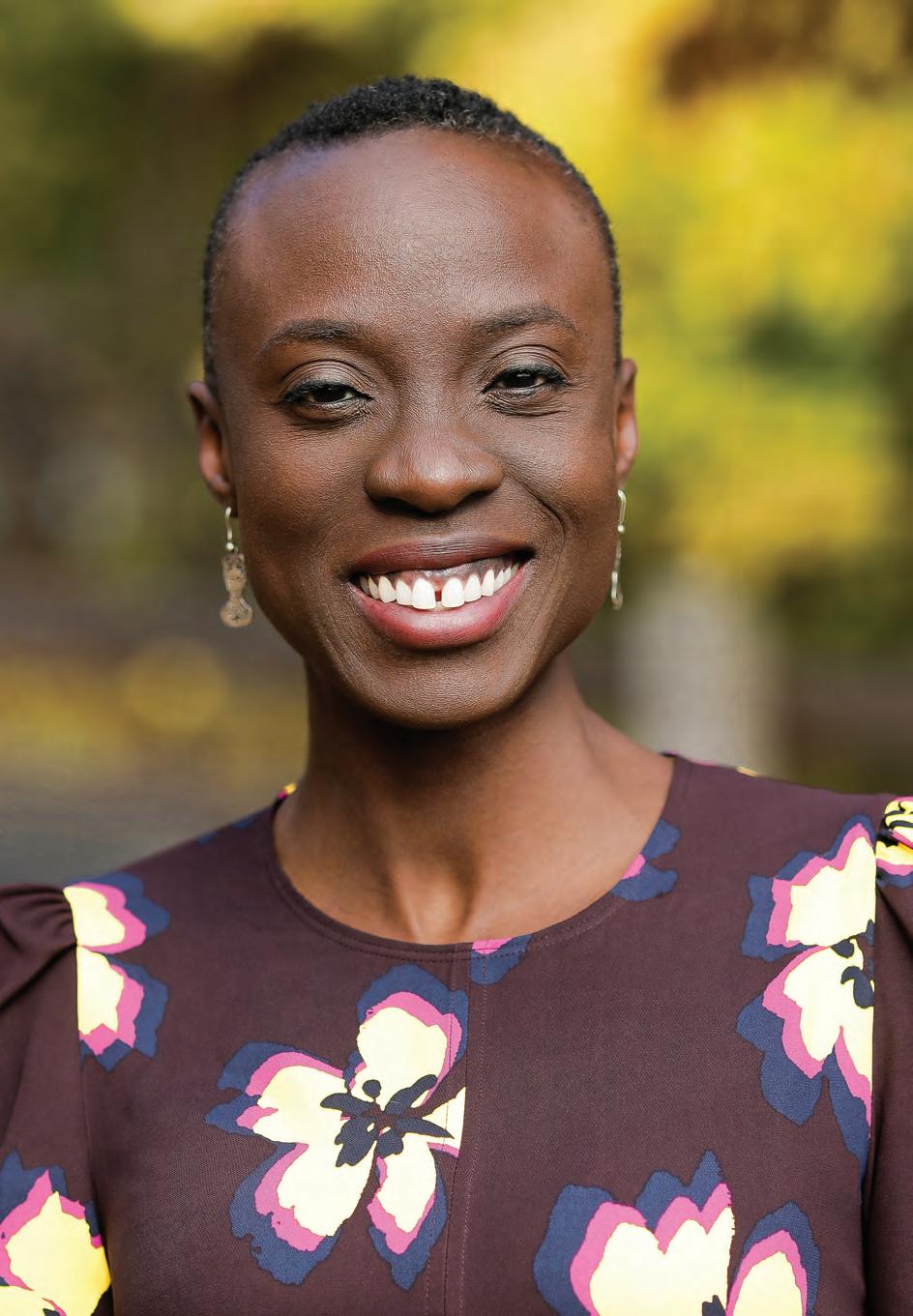
CATCHING UP WITH ALUMNI
15CONNIEL MALEK ’06 EXECUTIVE DIRECTOR TRUE COSTS INITIATIVE BROOKLINE, MASSACHUSETTS
DESCRIBE YOUR WORK: I lead a philanthropic nonprofit that partners with Global South groups in their advocacy to hold corporations accountable for the true environmental and social costs of their business operations in the Global South. Through the deep relationships we forge with local partners and others in the business and human rights space, we have advanced corporate accountability and human rights protection across the globe, from Thailand to El Salvador to Uganda to Nicaragua.
WHAT ACTIVITIES DO YOU ENJOY OUTSIDE OF WORK? I am an avid runner, fantasyfiction reader and travel enthusiast. Before my husband and I had kids, we traveled to four different countries in just our first year of dating and we never stopped. Our most recent adventures with our girls took us to Iceland, El Salvador and Mexico. We can’t wait for our next adventure!
ARE YOU WHERE YOU EXPECTED TO BE AT THIS STAGE OF YOUR CAREER AND LIFE? I began my career with the unique opportunity to go directly into in-house practice at a multinational corporation straight out of law school. I knew that it would open doors but didn’t know which ones. I had no idea that it would evolve into a career in philanthropy that allows me to merge my passion with the skills and experience I gained in my decade of corporate law practice. My corporate background, Caribbean heritage, strategic thinking and synthesizing skills have been invaluable in this new phase of my career.
WHAT DO YOU LIKE ABOUT YOUR LIFE 15 YEARS AFTER LAW SCHOOL? I like that each day I get to wake up, learn about the world and work with my team to identify and support opportunities to protect human rights and to protect the environment. I also love that my daughters look up to their mom with such pride and motivation. That is the ultimate gift.
ALUMNI 5, 10, 15 AND 25 YEARSAFTER LAW SCHOOL
25ERIC PERKINS ’96 OWNER PERKINS LAW PLLC RICHMOND, VIRGINIA

DESCRIBE YOUR WORK: My practice focuses on small-business, franchising and nonprofit law. My clients represent a wide variety of industries from real estate and restaurants to professional service firms and pro wrestlers. I see my place in the Central Virginia legal community as filling the void between “Big Law” and Legal Zoom.
WHAT ACTIVITIES DO YOU ENJOY OUTSIDE OF WORK? Family, tennis and community service are my top priorities and passions outside of work. I have played tennis for over 40 years; met my wife, Chrissie, thanks to tennis; and have had the chance to travel the world thanks to tennis. I volunteer at church and am currently president of the Rotary Club of Short Pump, but most of my volunteering takes place in the tennis community. I coach high school tennis, I co-authored a book on the history of tennis in Richmond to benefit the Richmond Tennis Association, and I was just appointed chair of the Sportsmanship Task Force for the United States Tennis Association.
ARE YOU WHERE YOU EXPECTED TO BE AT THIS STAGE OF YOUR CAREER AND LIFE? I could not have predicted my legal career unfolding the way it has, but there is no question that I have ended up in the right place. I experienced life as an attorney in a downtown law firm; as in-house counsel for a real estate company, where I came to enjoy the unglamorous (but rewarding) role of corporate whistleblower when I helped send my boss to prison for 100 years [Edward H. Okun, the former owner of The 1031 Tax Group, was sentenced in 2009 for defrauding clients]; and as a “solopreneur” for the past 12 years. The path had its moments of unexpected drama, but that was just part of the journey that brought me to where I am today.
WHAT DO YOU LIKE ABOUT YOUR LIFE 25 YEARS AFTER LAW SCHOOL? In October 2018, I suffered a stroke while playing a tennis match. Fortunately, it was over quickly and did no lasting damage, but such a brush with disaster enhances your appreciation of every moment of life and good health. I have been grateful for the opportunity to spend quality time with my family, to take care of my father during the final years of his life as he battled Parkinson’s and dementia, and to do my small part to have a positive impact in my community.








